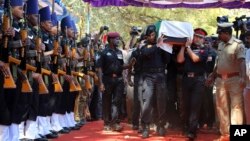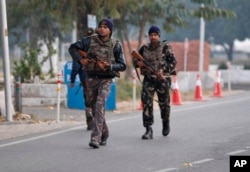An alliance of more than a dozen militant groups called the United Jihad Council, based in Pakistani Kashmir, has claimed responsibility for an attack by heavily armed gunmen on a strategic Indian airbase in Pathankot town, about 50 kilometers from the border with Pakistan.
Operations continued for a third day to secure the airbase in the northern Punjab state, which was infiltrated by heavily armed gunmen on Saturday. Five gunmen have been killed and seven security personnel have died in the attack, which could jeopardize peace talks between India and Pakistan.
The United Jihad Council, which is fighting to end Indian rule in Kashmir said it wanted to show India that no military installation was out of the reach of militants and India should allow Kashmiris to decide their political future.
The claim of responsibility came in a statement issued to a Srinagar-based news agency.
Reports in India have suggested that the Pakistan based Jaish-e-Mohammad group carried out the attack.
Airbase under attack
More soldiers armed with rocket launchers and mortar guns were sent into the defense facility on Monday.
Security officials said the search and combing operations are in the final stages, but could still take time because the air base sprawls over a very large area. “The entire operation will continue till all the personnel, assets, structures are physically combed, so it is likely to take a long time, but we would like to assure everyone that ” said Major General Dushyant Singh, a top officer of the National Security Guards, which is conducting the operation along with the army and the air force.
Officials pointed out that besides strategic assets, the airbase houses many families and schools. “It is like a mini city”, says Lt. General J.S. Dhamoon.
Officials stressed that all the installations at the base, which houses fighter jets and assualt helicopters, are safe. “I would like to assure everybody that all these air assets have been seured and are safe, there has been no damage to anyone of them,” Brigadier Anupinder Belvi told reporters.
Although officials are trying to stress that damage at the airbase was minimized, questions are being raised over how the gunmen managed to enter the military facility despite intelligence alerts about a possible terror attack. “There are serious holes in the entire security structure”, says Sukh Deo Muni at New Delhi’s Institute of Defense Studies and Analyses. “How should this happen after all the alerts that were given?”
Defending the airbase
Even as operations were continuing, India witnessed a second militant attack when four unidentified gunmen tried to storm its consulate in the Afghan town of Mazar-e-Sharif.
Indian Prime Minister, Narendra Modi held a meeting Monday to review both the attacks, which took place about a week after he visited Lahore in an effort to boost a flagging peace process with the rival nation.
Questions are now being raised in New Delhi on how the government will react and whether the attacks will impact talks scheduled to be held between the foreign secretaries of the two countries in Islamabad later this month.
Pakistan on Monday again condemned the airbase attack in India and says it is "working on the leads provided by" New Delhi to help investigate the deadly assault in line with Islamabad's commitment to effectively counter and eradicate terrorism.
A foreign ministry statement says that "living in the same region and with a common history, the two countries should remain committed to a sustained dialogue process." It added that the challenge of terrorism calls for strengthening our resolve to cooperative approach.
Analyst S.D. Muni says there is pressure from both within the ruling party, opposition parties and civil society to cancel the bilateral dialogue, but New Delhi’s options are limited. “I don’t think government has many better options, because cancelling the talks again puts the whole thing into square one. What do you? If you don’t talk, this is where you come to a dead end of diplomacy,” says Muni.
Ayaz Gul contributed to this report from Islamabad.





